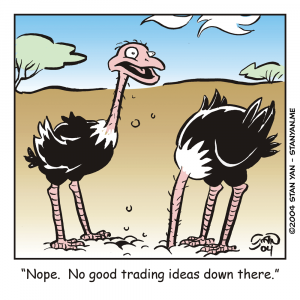When the defensive linemen go out onto the playing field, they make sure they have helmets, facemasks, shoulder pads and other protection. The opposition is often formidable and there’s no reason to unnecessarily risk getting hurt. When it comes to trading, it’s also vital to have proper protection. Adverse forces may go against your trading plan, and unless you protect yourself, you run the risk of getting hurt, and with trading, that often means substantial hits to your account balance.
There’s also a psychological advantage to going out onto the playing field with the proper protection. Taking the football analogy one step further, consider the quarterback who doesn’t have a wall of teammates on the line defending him. If they can’t hold back the opposition, he has to make a play under pressure.
He may feel the need to throw the pass too soon to avoid getting sacked. Acting under pressure often leads to an error, such as throwing an interception or dropping the ball. Proper protection, in contrast, not only protects the quarterback from possible injury, but it gives him the time and opportunity to think more clearly, make a calm, thorough survey of all possibilities, and throw the ball to the player who has the best chance of making it to the goal line. It’s also true with trading.
If you have money on the line that you are afraid to lose, you may feel like the quarterback who is afraid of getting sacked. It’s hard to stay relaxed and focused. One feels the pressure to act quickly so as to avoid harm. This often results in impulsive decisions, and over the long haul, a significant loss of capital. Risk management provides not only protection from financial loss but also gives the trader a psychological advantage.
Just as when playing sports, there’s an optimal level of energy that a trader should try to maintain. A tired and listless player can’t even play the game, but on the other hand, too much energy is detrimental. When one is under too much pressure and totally stressed out, he or she can’t think clearly. This is due to the fight-or-flee response. The body responds to threat by focusing all energy on impulsive reactions to neutralize the threat.
When the stress is on, there’s a natural human tendency to narrow one’s focus and react spontaneously. Such impulsive reactions usually fail to produce a desirable outcome. It’s just like the quarterback who accidentally throws the ball into the hands of the opponent because he felt enormous pressure to act. For the trader, proper risk management allows the trader to control stress and trade at the optimal energy level.
There are many ways to manage risk. But one of the best ways is to develop a very detailed trading plan in which you estimate the potential risk upfront. For example, you may estimate how far the trade may move against you. When going long on a swing trade, you may reason that the most the price will go against you are the low of the previous week.
That will give you an estimate of risk upfront. Many trading experts also suggest making sure that the amount of risk you take on is only a small percentage of your trading capital, so that should you lose on the trade, the loss will be at a minimum. Whatever approach you take to managing risk, the point is that managing risk has both financial and psychological advantages.
Psychologically, you’ll feel a sense of security. Deep down, you will know that should you lose on the trade, it can’t hurt you very much. It’s only a small part of your capital, and you know you will survive to move on to new opportunities. You will feel more relaxed. And when you feel calm, your mind will be open to all possibilities. You can gauge the market action more objectively than when under pressure. In all likelihood, your mind will move with the market, and you will be able to trade effortlessly and reach a peak performance state.
In both trading and athletics, a calm, focused approach is optimal. Extreme pressure and stress constrict one’s attention to the point that few alternatives seem available. Decisions are impulsive and reckless rather than logical and decisive. Risk protection is a key factor that traders use to provide psychological protection against adverse forces that may knock them off balance. Put up a strong defence by using proper risk management, and you’ll be able to trade in a peak performance mental state.


